 In just under one month, many Americans will head to the polls to decide who will be the next president of our country. It’s kind of a big deal. So big, in fact, that I think it requires voters to take a little extra time to consider their decision before they fill in the bubbles on a ballot (or punch holes or tap a screen … however your state rolls).
In just under one month, many Americans will head to the polls to decide who will be the next president of our country. It’s kind of a big deal. So big, in fact, that I think it requires voters to take a little extra time to consider their decision before they fill in the bubbles on a ballot (or punch holes or tap a screen … however your state rolls).
There are many important issues in this election that both candidates have strong stances on. None of them are arbitrary, random ideas someone decided to believe. The candidates probably sat down with members of their parties and campaign staff to decide the best way to handle them by taking many things into consideration.
Both Gov. Mitt Romney and President Barack Obama have taken the time to research the issues and what is important to the American people to decide their platforms. Voters owe it to the candidates to do the same when it comes to deciding how to vote.
There are people out there who consistently vote for one party or the other simply because of their stance on a single issue or a few of the current hot topics in America. I believe this kind of voting does the United States a great disservice. An elected official’s job is not just to work with one or two specific issues, but to handle a myriad of problems and policies to make sure the American people are being served by their government in the best possible way.
Before you vote, I think you have a responsibility to your country and fellow citizens to do your research. You may wholeheartedly agree with a particular candidate on one issue, but when you look closer, some of their other policies may seem questionable. You are not voting on a specific bill – you are voting for the highest office in our land. Remember that. Examine the campaign websites of each candidate and do even further research. Read newspaper articles from multiple sources about candidates and listen to your friends’ and family members’ opinions. What’s amazing about the United States today is that we have the freedom to engage in political discourse in many different ways — in print, online and in person. Take advantage of that when you are making your decision for whom to vote.
And do not forget about local issues. Yes, Nov. 6 is the date of the presidential election, but many local offices and issues will also be on your ballot. No matter which state you vote in, don’t forget about them. Blur party lines and vote for the people you most agree with to serve you and your fellow citizens, not just every candidate from a particular party simply because they are part of that party.
There are also many people who say neither Romney nor Obama is fit to be the president. These people are completely entitled to that opinion, but it’s pretty much a guarantee that, come November, one or the other will be voted into office. Some people may wish to withhold their vote because they do not think either should be elected, and some people may have completely legitimate reasons to do so. However, if these people were to really examine each candidate, they may find that one seems more qualified than the other to run our country. It would make much more sense to cast a vote for that individual in order to take a step toward electing the most able president.
I highly encourage all of you who are 18 or older to first make sure you are registered to vote and second, to take some time to do a little research about what and whom you will be voting for in four weeks. You already have a newspaper in your hands or a news website open. You might as well spend a little more time reading today.

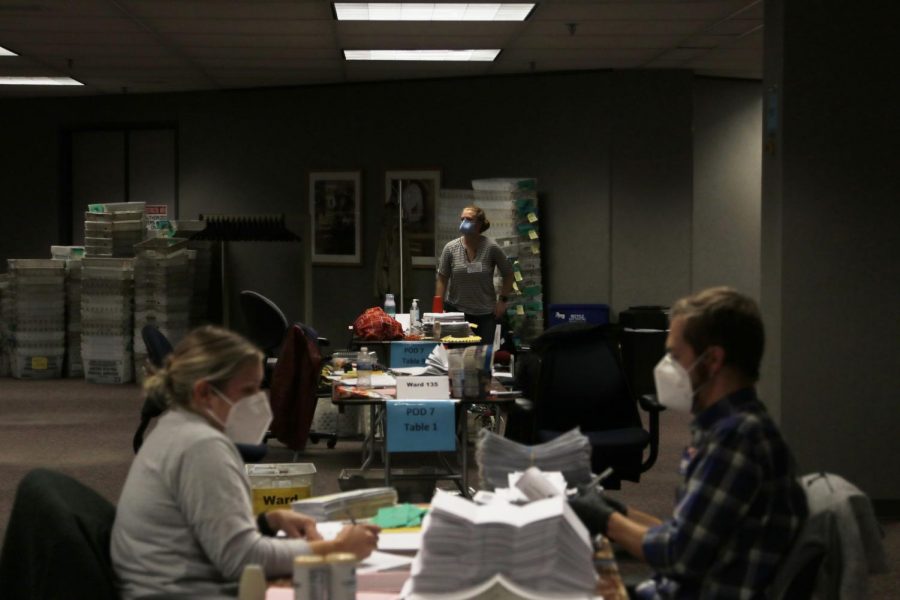
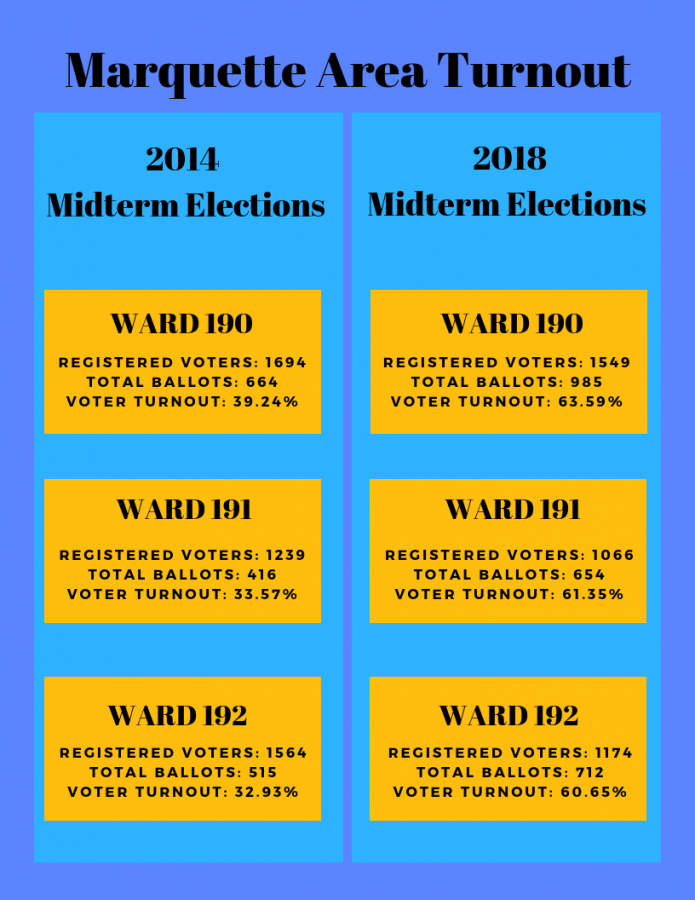
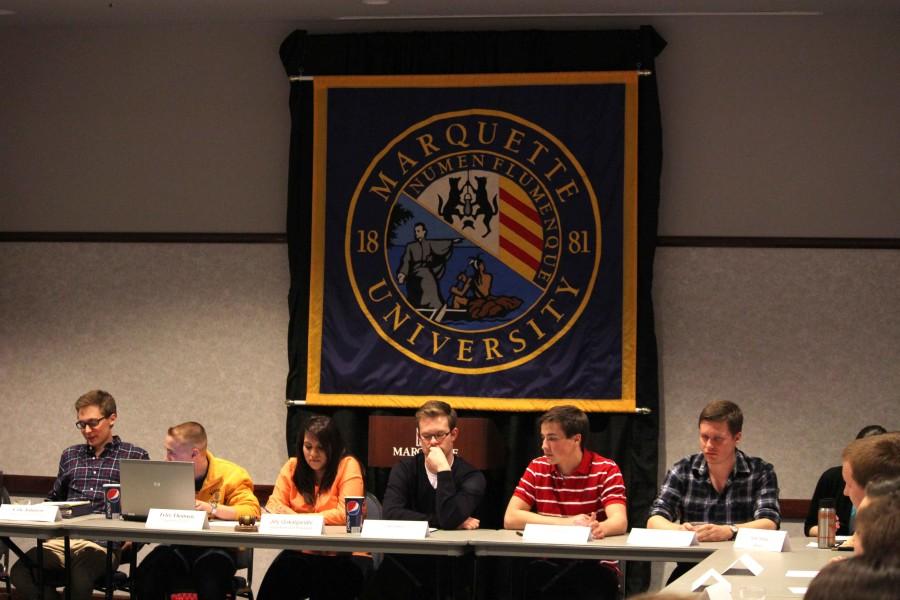
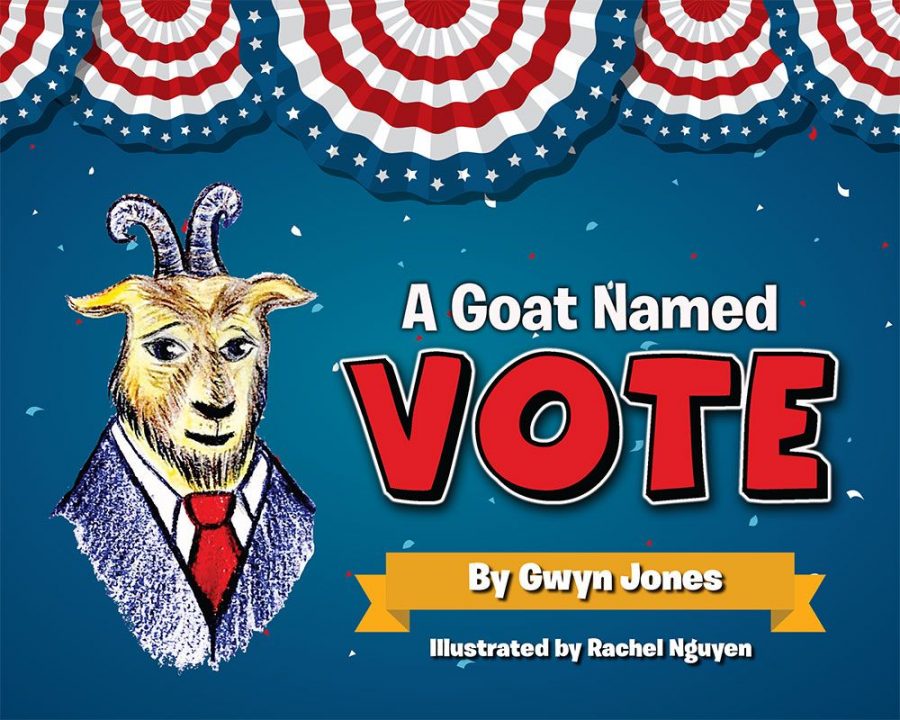


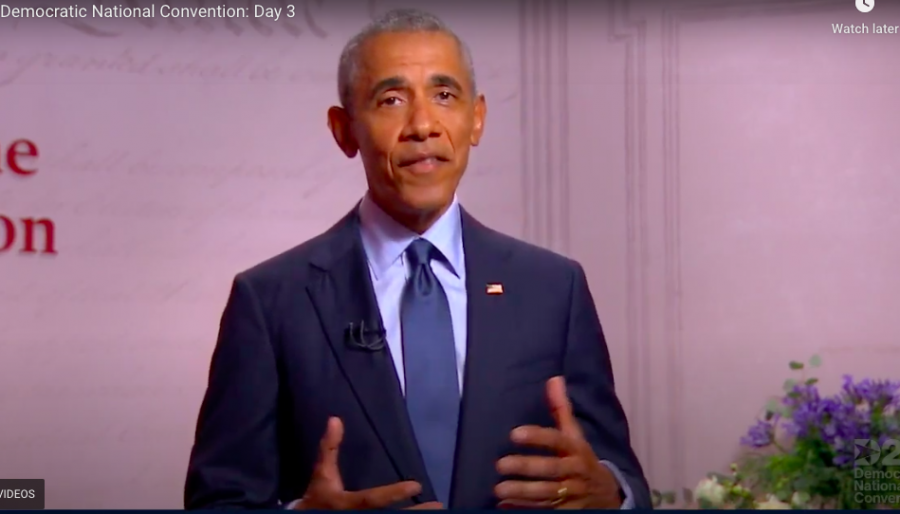

Seamus D. • Oct 11, 2012 at 7:35 am
So we should just sit down and give up? Don’t you think political discourse is the way to fix it? I have a hard time seeing, or even thinking about the argument, “It’s broken, there is nothing we can do, so let’s just give up.
When I have a problem I try to fix it; when my family has a problem, we work together to fix it as a family; when our neighborhood has a problem, we try to fix it as a community, why should our Federal Government be any different?
I’m not saying Democrat or Republican, I’m saying that our Political System gives us nearly unparalleled freedom over 225 years in the making. Isn’t it worth a little effort to fix it?
Nice column Caroline!
Peter Palms • Oct 10, 2012 at 12:39 pm
It doesn’t matter who is elected. Neither one will do what the voters want. If no one showed up for this election that would matter as an awakening to to absence of government by and for the people.. America has lost control of what used to be their government.
The
Wall Street Journal ran an article the likes of which I have never seen.
“The Magnitude of the Mess We’re In.”
It was written by five well-known economists. It warns readers about a series
of highly destructive outcomes of the federal government’s present fiscal
policies. The article says that these problems are close to being unmanageable.
The
first economist involved is George Schulze. He taught at the University of Chicago and
MIT. He served as the Secretary of the Treasury under Nixon and Secretary of
State under Reagan. He served as the Head of the Office of Management and
Budget under Nixon, and also Secretary of Labor under Nixon. I can think of no
other economist with comparable experience at the highest level. He is an
insider’s insider. He is 92 years old – a true elder statesman
The
second economist is Michael Boskin. He teaches at the Hoover Institution. He
used to teach at Stanford. He was the head of the Council of Economic Advisers
under the first Bush. Then there was John F. Cogan of Hoover and
Stanford. Then there was Allan Meltzer, who is the most respected historian of
the Federal Reserve System. Finally, there was Stanford’s John Taylor, of
“Taylor
rule” fame, one of the most respected academic economists in the USA.
A NAÏVE ARTICLE
The
problem with this article is it is na‹ve. It is Pollyanna to the core. It
begins with the on-budget deficit: a mere $1.2 trillion a year. The on-budget
deficit is peripheral to the real federal deficit, which reflects the unfunded
liabilities of the federal government, primarily in Social Security, Medicare,
and Medicaid. This deficit dwarfs the on-budget deficit. It is rising at $11 trillion a year.
This
deficit has a present value of $222 trillion. This means that the federal
government, today, must invest $222 trillion in market investments that will
return about 5% per year for the next 75 years. No such investments exist, and
the federal government does not have $222 trillion in reserve. The Federal
Reserve system could print that, of course, but then that would only lead to
hyperinflation.
In
other words, by starting with the on-budget deficit, the five economists
low-balled the problem. This makes look as though the problem can be dealt with
by Congress. It cannot, except by one technique, namely, default. They mention
unfunded liabilities only briefly, and they offer no numbers.
Nevertheless,
in a na‹ve sort of way, the five economists do point out that present politics
makes it virtually impossible for the on-budget deficit not to escalate, and if
it does, it is going to lead to a series of inevitable disasters. The five
economists go into the details about these disasters, and it is a good thing
that somebody bothered to do this.
The
article began with a good question: “Where are we now?” Answer: a lot
worse off than the article says.
It
asks this question: “Did you know that annual spending by the federal
government now exceeds the 2007 level by about $1 trillion?” I do. You do.
Who doesn’t?
They
list the deficits: $1.4 trillion in 2009, $1.3 trillion in 2010, $1.3 trillion
in 2011, and another $1.2 in 2012. “The four-year increase in borrowing
amounts to $55,000 per U.S.
household.”
Recall
that the unfunded liability’s present value grew by $11 trillion over the past
12 months. So, the article low-balls the magnitude of the mess we are in.
The
Treasury must raise $4 trillion this year to pay the interest on the on-budget
debt. They warn: “. . . the debt burden will explode when interest rates
go up.” Quite true.
The
government cannot tax upper-income people. The top 1% pay 37% of the incomes
taxes. (That is because they make most of the income, which the authors do not
mention.)
Did
you know that, during the last fiscal year, around three-quarters of the
deficit was financed by the Federal Reserve? Foreign governments accounted for
most of the rest, as American citizens’ and institutions’ purchases and sales
netted to about zero. The Fed now owns one in six dollars of the national debt,
the largest percentage of GDP in
history, larger than even at the end of World War II.
This
is true. But this means that the Treasury will get back most of the $4 trillion
it pays as interest. The FED repays
most of this at the end of the year. This is an accounting device.
Conclusion:
“By replacing large decentralized markets with centralized control by a
few government officials, the Fed is distorting incentives and interfering with
price discovery with unintended economic consequences.” This is true. It
lies at the heart of the mess we are in.
The
Fed’s policy of keeping interest rates so low for so long means that the real
rate (after accounting for inflation) is negative, thereby cutting
significantly the real income of those who have saved for retirement over their
lifetime.
Bernanke’s
FOMC says this will continue until at least 2015.
They
say that the FED is
replacing the Treasury as the source of government debt management. They are
correct.
They
warn of price inflation. The reserves of QE3 could do this. But if the FED
unwinds too fast – sells assets, abandoning QE – “banks may find it hard
to adjust and pull back on loans. Unwinding would be hard to manage now, but
will become ever harder the more the balance sheet rises.”
The
FED tried
to unwind over the last 12 months. They do not mention this. The result: the FED’s
panic return to QE3. There will be no unwinding.
Then
they summarize some highlights, though peripheral. “Did you know that the
federal government had 46 separate job-training programs? Yet a 47th for green
jobs was added, and the success rate was so poor that the Department of Labor
inspector general said it should be shut down. We need to get much better
results from current programs, serving a more carefully targeted set of people
with more effective programs that increase their opportunities.” In short,
blah, blah, blah. If we have 46, one more program is marginal, and there will
not be the elimination of (say) 45 of them.
They
go on and on, telling us of boondoggles. This is just noise. Nothing is going
to change.
Then
they get to Obama’s budget. That budget will “raise the federal debt-to-GDP ratio
to 80.4% in two years, about double its level at the end of 2008, and a larger
percentage point increase than Greece from
the end of 2008 to the beginning of this year.” Quite true. But this
budget was passed by Congress. All budgets are passed by Congress.
We
are headed toward $18.8 trillion in debt. That will take $743 billion in
interest payments. But, as they fail to mention, most of this will go to the FED, and
will be returned. The problem is this: there is no negative feedback for
Congress. Rates are close to zero.
Then
they get to the really tough nut to crack: the unfunded liabilities. But they
offer no specifics.
Worse,
the unfunded long-run liabilities of Social Security, Medicare and Medicaid add
tens of trillions of dollars to the debt, mostly due to rising real benefits
per beneficiary. Before long, all the government will be able to do is finance
the debt and pay pension and medical benefits. This spending will crowd out all
other necessary government functions.
No,
it won’t. Why not? Because there will be a default on these programs. Younger
voters will mandate this. Granny is going to get her checks cut off. The
following will not happen: “One result will be ever-higher income and
payroll taxes on all taxpayers that will reach over 80% at the top and 70% for
many middle-income working couples.”
QE3
creates uncertainty, they say. Quite true. “Traders speculate whether and
when the Fed will intervene next. The Fed can intervene without limit in any
credit market. . . .” Quite true.
Then
they mention what was never mentioned before Ron Paul’s run in 2007: “This
raises questions about why an independent agency of government should have this
power.”
Then
they ask: “What’s at stake?” It’s the right question.
Treasury
debt is not a safe haven forever, they say. Good point.
“In
short, we risk passing an economic, fiscal and financial point of no
return.” There. Someone said it. Of course, we are far beyond the point of
no return. The $222 trillion in the present value of the unfunded liabilities
guarantees this.
The
USA could
lose its full faith and credit status.
They
see this as a great danger. I see it as liberation. They quote Alexander
Hamilton on the benefits of the federal debt. I much prefer Thomas Jefferson’s
assessment. The full faith and credit of the U.S.
government allowed the government to finance the Civil War and World War II.
Quite true, and that is why its loss would be a great thing.
Then
comes the bottom line.
The
problems are close to being unmanageable now. If we stay on the current path,
they will wind up being completely unmanageable, culminating in an unwelcome
explosion and crisis.
We
are going to stay on the present path. The problems will become unmanageable.
The
U.S.
government is going to default. The five do not use the D-word, but what they
say points to it.
Then
they push to full Polyanna mode.
The
fixes are blindingly obvious. Economic theory, empirical studies and historical
experience teach that the solutions are the lowest possible tax rates on the
broadest base, sufficient to fund the necessary functions of government on
balance over the business cycle; sound monetary policy; trade liberalization;
spending control and entitlement reform; and regulatory, litigation and
education reform. The need is clear. Why wait for disaster? The future is now.
They
are correct. The future is now. And it is not going to change. Politics guarantees
this.
CONCLUSION
I
was happy to see an article from mainstream economists on the mess we are in.
Of course, the mess is vastly worse than they indicate. The on-budget debt of
$15 trillion is peanuts compared to the $222 trillion of present-value net unfunded
liabilities. But the mess is bad enough to warrant this article.
Nothing
will change Congress. Nothing will change the executive. There will be no
cutback in spending until the numbers force the Great Default.
Americans
will not be ready. State and local governments will not be ready.
Will you be ready?
Peter Palms • Oct 9, 2012 at 7:22 pm
It does not matter. If you do not understand that then you have not awakened.
The last time federal spending was reduced from one year to the next was a
half-century ago, during the Eisenhower administration.
Since then, it matters little which party is in office because both sides
have increased spending. Each side also has a habit of meddling in foreign
affairs, starting wars, borrowing without consideration, and both Democrats and
Republicans support a limitless government and its intrusion in our lives.
Your vote may make you feel good about our form of government, but if history
is any sort of guide, it will have little effect on the nation’s direction. The
sad truth is that the entity that controls our nation’s fate really isn’t in
the White House, Senate or House of Representatives.
Mayer Amschel Rothschild is credited with saying, “Give me control of a
nation’s money and I care not who makes the law.”
In the United States,
our nation’s money is controlled by a handful of financiers operating an
independent bank known as the U.S. Federal Reserve.
If you are under the false impression that this bank is government
controlled, think again.
The legislation was drafted by a handful of private bankers. It was passed
by an act of Congress on Dec. 23,
1913, and signed into law one hour later by President Woodrow
Wilson.
Our president does appoint the Federal Reserve chairman, however, neither he
nor any other government entity, ratifies decisions made by the Federal
Reserve.
In other words, the power to destroy our nation’s currency and economy are
in the hands of a very few. Unfortunately, these few are not chosen by the
population they claim to assist.
And perhaps before we go further, we should examine the results of nearly a
century of Federal Reserve actions. Using the Consumer Price Index, we find
that an item costing a dollar in 1913 would cost about $23.52 today.
In other words, your buck has lost more than 95 percent of its value.
If we based our calculations on gold, the picture is even bleaker with that
same dollar worth now a little more than penny.
What was once one of the soundest currencies on the planet, backed by gold
and silver in 1913, is today backed by nothing other than our government’s
authority to tax. Perhaps not so coincidentally, the Sixteenth Amendment (the
income tax) was ratified just a few months before the Federal Reserve Act.
We’ve been silently robbed through currency debasing since the moment the
Fed began. Each subsequent manipulation, under benign names like “quantitative
easing,” steals more of your money.
Here is what Wilson said later
about what he unknowingly helped bring into existence.
“A great industrial nation is controlled by its system of credit. Our system
of credit is privately concentrated. The growth of the nation, therefore, and
all our activities are in the hands of a few men who, even if their action be
honest and intended for the public interest, are necessarily concentrated upon
the great undertakings in which their own money is involved and who
necessarily, by very reason of their own limitations, chill and check and
destroy genuine economic freedom.”
And so as you step behind the ballot curtain and cast your vote for the next
U.S. president,
be prepared to be disappointed.
The only power to change the direction of this country is found with the
central bank. As long as these bankers continue to provide the politician’s
with enough funny money to pay for their welfare and warfare, real change is
exactly what you know it to be: an empty campaign slogan.
Read more here:
http://www.kansascity.com/2012/10/05/3849962/g-joseph-mcliney-will-your-vote.html#storylink=cpy
Peter Palms • Oct 9, 2012 at 7:22 pm
It does not matter. If you do not understand that then you have not awakened.
The last time federal spending was reduced from one year to the next was a
half-century ago, during the Eisenhower administration.
Since then, it matters little which party is in office because both sides
have increased spending. Each side also has a habit of meddling in foreign
affairs, starting wars, borrowing without consideration, and both Democrats and
Republicans support a limitless government and its intrusion in our lives.
Your vote may make you feel good about our form of government, but if history
is any sort of guide, it will have little effect on the nation’s direction. The
sad truth is that the entity that controls our nation’s fate really isn’t in
the White House, Senate or House of Representatives.
Mayer Amschel Rothschild is credited with saying, “Give me control of a
nation’s money and I care not who makes the law.”
In the United States,
our nation’s money is controlled by a handful of financiers operating an
independent bank known as the U.S. Federal Reserve.
If you are under the false impression that this bank is government
controlled, think again.
The legislation was drafted by a handful of private bankers. It was passed
by an act of Congress on Dec. 23,
1913, and signed into law one hour later by President Woodrow
Wilson.
Our president does appoint the Federal Reserve chairman, however, neither he
nor any other government entity, ratifies decisions made by the Federal
Reserve.
In other words, the power to destroy our nation’s currency and economy are
in the hands of a very few. Unfortunately, these few are not chosen by the
population they claim to assist.
And perhaps before we go further, we should examine the results of nearly a
century of Federal Reserve actions. Using the Consumer Price Index, we find
that an item costing a dollar in 1913 would cost about $23.52 today.
In other words, your buck has lost more than 95 percent of its value.
If we based our calculations on gold, the picture is even bleaker with that
same dollar worth now a little more than penny.
What was once one of the soundest currencies on the planet, backed by gold
and silver in 1913, is today backed by nothing other than our government’s
authority to tax. Perhaps not so coincidentally, the Sixteenth Amendment (the
income tax) was ratified just a few months before the Federal Reserve Act.
We’ve been silently robbed through currency debasing since the moment the
Fed began. Each subsequent manipulation, under benign names like “quantitative
easing,” steals more of your money.
Here is what Wilson said later
about what he unknowingly helped bring into existence.
“A great industrial nation is controlled by its system of credit. Our system
of credit is privately concentrated. The growth of the nation, therefore, and
all our activities are in the hands of a few men who, even if their action be
honest and intended for the public interest, are necessarily concentrated upon
the great undertakings in which their own money is involved and who
necessarily, by very reason of their own limitations, chill and check and
destroy genuine economic freedom.”
And so as you step behind the ballot curtain and cast your vote for the next
U.S. president,
be prepared to be disappointed.
The only power to change the direction of this country is found with the
central bank. As long as these bankers continue to provide the politician’s
with enough funny money to pay for their welfare and warfare, real change is
exactly what you know it to be: an empty campaign slogan.
Read more here:
http://www.kansascity.com/2012/10/05/3849962/g-joseph-mcliney-will-your-vote.html#storylink=cpy